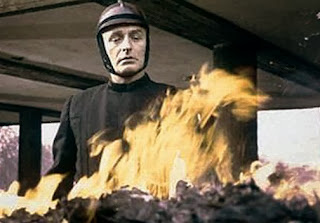Consider a situation where books are banned or it is illegal to
possess books. What would be the condition of such a society? That is exactly
what director Francois Truffaut tries to show in his 1966 film Fahrenheit 451. The subject of the film
might look a little exaggerated. However, it should be taken as a satire on
states and societies that in different ways and means have repeatedly
attempted, and at times succeeded, in subduing and silencing the voice of
people.
Director: Francois Truffaut
Film Clip
The film is loosely based on the 1953 novel of the same name by Ray
Bradbury. The title apparently means the auto-ignition point temperature of paper. He wrote the novel keeping in mind the draconian censorship laws of
McCarthy in the United States that attempted to silence people. In the film, a
law enforcing agency goes about unearthing hideouts where books are hidden and setting
them on fire. Possessing books in houses is against the law and as such can
attract the ire of the state. Hence, anyone who knows of people in possession
of books is supposed to report the matter to the authorities so that the agency
can come and ‘deal’ with people who go against the law.
However, there is this leader of the agency by name Montag, who somehow
becomes aware of the danger and implication of his action. He realises the
worth of books and somehow cannot carry on destroying them. But the law catches
up with him and he has nowhere to go, except to a community of book people.
Book people are none other than those who preserve a book each in the most
unlikely of places – their memory; and they are able to pass them on to their
posterity. Such an exercise goes on to show that the state cannot really
destroy books from people’s memory.
The film is indeed a masterpiece in terms of its message and
delivery. Nowhere does Truffaut attempt to be preachy. The visuals speak for
themselves.
- Melwyn Pinto SJ









No comments:
Post a Comment